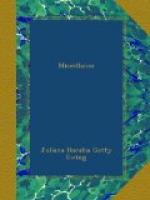One cannot help thinking that some of our flowers, such as Milkmaids, Lords and Ladies, and Jack-in-the-green Primrose, bear traces of having got their common names at the great flower festival of the year.
In Cornwall boys carried the May-garland, which was adorned with painted birds’ eggs. Old custom gave these young rogues the privilege of drenching with water from a bucket any one whom they caught abroad on May-morning without a sprig of May.
Mr. Aubrey says (1686): “At Oxford, the boyes do blow cows’ horns all night; and on May-day the young maids of every parish carry about their parish garlands of flowers, which afterwards they hang up in their churches.”
A generation or more ago the little boys of Oxford used to blow horns early on May-day—as they said—“to call up the old maids.” There was once a custom in Lynn for the workhouse children to be allowed to go out with horns and garlands every May-day, after which a certain worthy gentleman gave them a good dinner.
In Cambridgeshire, within the present century, the children had a doll dressed as the “May Lady,” before which they set a table with wine and food on it; they also begged money and garlands for “the poor May Lady.”
There are some quaint superstitions connected with May-day and May-blossom. To bathe the face in the dew of a May morning was reckoned an infallible recipe for a good complexion. A bath of May dew was also supposed to strengthen weakly children. Girls divined for dreams of their future husbands with a sprig of hawthorn gathered before dusk on May-eve, and carried home in the mouth without speaking. Hawthorn rods were used at all seasons of the year to divine for water and minerals. Bunches of May fastened against houses were supposed to keep away witches and venomous reptiles, and to bring prosperity in various shapes.
The Irish of the neighbourhood of Killarney have a pretty superstition that on May-day the O’Donoghue, a popular prince of by-gone days, returns from the land of Immortal Youth beneath the water to bless the country over which he once ruled.




